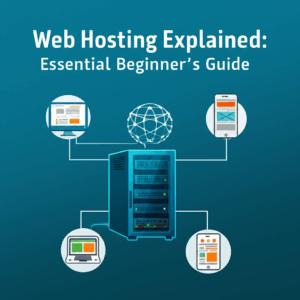- What is Web Hosting, and Why Do You Need It?
- Different Types of Web Hosting Explained
- Shared Hosting
- VPS Hosting (Virtual Private Server)
- Dedicated Hosting
- Cloud Hosting
- WordPress Hosting
- Key Factors to Consider When Choosing a Web Hosting Provider
- Web Hosting Explained: Making the Right Choice
Web Hosting Explained: An Essential Beginner’s Guide
Web hosting is the foundation of every website you visit online. Without it, your website wouldn’t exist on the internet. It’s essentially renting space on a powerful computer, called a server, that’s connected to the internet 24/7. This server stores all the files, images, and data that make up your website, allowing anyone in the world to access it at any time. Think of it like renting a physical store to display and sell your products; web hosting provides the digital space to display your website to the world. But with so many different types of web hosting available, choosing the right one can be overwhelming, especially for beginners. This beginner’s guide aims to demystify web hosting and equip you with the knowledge to make an informed decision.
What is Web Hosting, and Why Do You Need It?

Imagine you’ve built a beautiful website using HTML, CSS, and JavaScript. You’re proud of your creation and eager to share it with the world. But simply creating the files doesn’t make them accessible online. You need a place to store those files where they can be accessed by anyone with an internet connection. That’s where web hosting comes in. Web hosting providers own and maintain powerful servers, offering space on these servers for you to store your website files.
Different Types of Web Hosting Explained
Choosing the right web hosting plan depends on several factors, including your website’s purpose, traffic volume, technical expertise, and budget. Here are the most common types of web hosting available:
Shared Hosting
Shared hosting is the most affordable option and ideal for beginners and small websites. In this setup, multiple websites share the resources of a single server. Think of it like sharing an apartment with roommates – you all share the kitchen, living room, and other common areas. This shared resource model makes it cost-effective, but it also means that performance can be affected if one website on the server experiences a surge in traffic.
VPS Hosting (Virtual Private Server)
VPS hosting offers a balance between affordability and performance. While still sharing a physical server with other users, your website resides in its own virtual compartment with dedicated resources. Imagine living in an apartment complex with your own private apartment. You share the building, but have your own dedicated space. VPS hosting provides more control and stability than shared hosting, making it suitable for growing websites.
Dedicated Hosting
Dedicated hosting provides the ultimate in performance and control. With dedicated hosting, you rent an entire physical server exclusively for your website. This translates to maximum resources, flexibility, and security. Imagine owning an entire building – you have complete control over everything. Dedicated hosting is typically more expensive and requires technical expertise.
Cloud Hosting
Cloud hosting utilizes multiple servers working together to host your website. This provides high availability and scalability. If one server experiences issues, another automatically takes over, ensuring your website remains online. Cloud hosting is ideal for websites expecting high traffic volumes and requiring high uptime.
WordPress Hosting
WordPress hosting is specifically optimized for WordPress websites. These hosting plans often come pre-installed with WordPress and offer features like automatic updates and enhanced security. If you’re planning to build your website using WordPress, this is a convenient and often efficient option.
Key Factors to Consider When Choosing a Web Hosting Provider
Choosing the right web hosting provider is crucial for your website’s success. Here are some key factors to consider:
Uptime: Look for a provider with a guaranteed uptime of at least 99.9%. This ensures your website is accessible to visitors almost all the time.
Customer Support: Reliable customer support is essential, especially when encountering technical issues. Choose a provider with 24/7 support via phone, email, or live chat.
Pricing: Compare pricing plans carefully and avoid overly cheap options that may compromise performance or security.
Features: Consider essential features like storage space, bandwidth, email accounts, and databases.
Security: Website security is paramount. Choose a provider with robust security measures like SSL certificates, firewalls, and malware protection.
Scalability: Ensure your hosting plan can accommodate your website’s growth in the future.
Web Hosting Explained: Making the Right Choice
Understanding web hosting is essential for anyone looking to establish an online presence. By carefully considering your website’s needs, budget, and the different types of web hosting available, you can choose the right plan to set your website up for success. Take your time to research different providers, compare their offerings, and select the one that best suits your requirements. With the right web hosting provider, your website can thrive and reach its full potential.











Leave a Reply